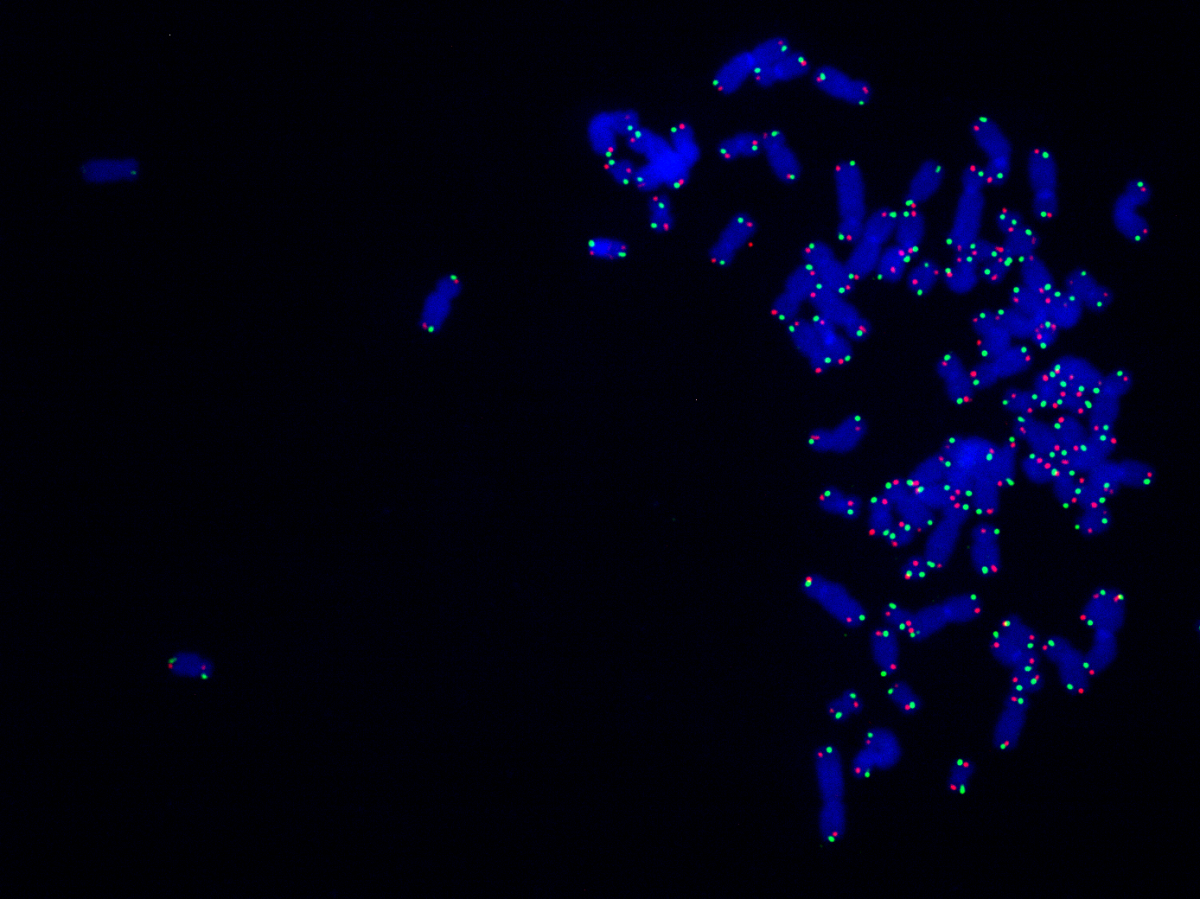

30/11/2020
Age, obesity, diabetes, hypertension ... Many severity factors of COVID-19 infection are now well identified. However, many patients who do not meet these criteria can also suffer from the virus and sometimes severely. Anabelle Decottignies' team at the de Duve Institute, in collaboration with researchers from the Saint-Luc University Clinics, investigated the potential role of telomeres in COVID-19.
Telomeres are DNA sequences that protect the ends of chromosomes and shorten with each cell division. Their size decreases with cell’s age but also between individuals. When they get too short, especially in older people, cells enter into senescence. These structures therefore play the role of a cellular biological clock.
However, telomere length is not the same for all individuals of the same age. It depends, among other things, on certain genetic variants. Along with a demonstrated impact on the occurrence of many chronic diseases, telomere shortening could affect our defenses against viruses. This is why Professors Antoine Froidure (Department of Pneumology, Cliniques Saint-Luc and Institute for Experimental and Clinical Research, UCLouvain) and Anabelle Decottignies (de Duve Institute, UCLouvain) decided to investigate the potential link between telomere size and COVID-19.
The length of telomeres in blood cells mirrors that of the body. Over the past three years, Anabelle Decottignies’ laboratory has developed an assay to measure telomere length from a blood test. In collaboration with Professors B. Brichard, I. Scheers and J.P. Defour of the Saint-Luc University Clinics, the team was able to obtain the reference curves for telomere length in nearly 500 healthy Belgian residents between 0 and 99 years old. Thanks to these reference curves, the study in COVID-19 patients could be initiated.
Concretely, the researchers recruited 70 patients hospitalized for a COVID-19 infection at the Clinics during the first wave of the pandemic (between April 7 and May 27, 2020). Aged 27 to 96 years, this population was compared to the results of the control group, referring, for each patient, to the average for healthy people of the same age.
In the cohort of patients hospitalized with a severe form of COVID-19, telomeres were found to be shorter than in the reference group. In other words, 40% of patients hospitalized with severe COVID-19 had a telomere size below the 10th percentile (P10) for their age. The study also found that having very short telomeres (<P10) was associated with a significantly higher risk of ICU admission or death.
These results open up important perspectives in understanding the mechanisms of immunity against the coronavirus.

|
Human metaphasic chromosomes are labeled with fluorescent telomeric probes, which appear red or green at the ends of sister chromatids on each chromosome. DNA appears in blue. |
Article describing this research
Short telomeres increase the risk of severe COVID-19
Aging (Albany NY). 2020; 12:19911-19922
In the press
NewsyToday.com - Coronavirus: Belgian study shows that severe Covid-19 is favored by short telomeres - 27/11/2020
LaLibre.be - Une étude belge démontre que le Covid sévère est favorisé par des télomères courts - 25/11/2020
LeVif.be - La forme sévère du Covid pourrait être déterminée par nos chromosomes - 25/11/2020
RTL.be - Coronavirus: une étude belge démontre que le Covid-19 sévère est favorisé par des télomères courts - 25/11/2020
BX1.be - Une équipe de Saint-Luc fait une découverte sur les formes sévères de Covid-19 - 25/11/2020
DHnet.be - Le Covid sévère est favorisé par des télomères courts, selon une étude de Saint-Luc - 25/11/2020
7sur7.be - Une étude de Saint-Luc le démontre: la Covid-19 sévère est favorisée par des télomères courts - 25/11/2020
Lavenir.net - Des télomères plus courts favorisent les formes sévères du Covid-19: c’est une étude belge qui le démontre - 25/11/2020
Sudinfo.be - Les formes sévères de Covid-19 sont favorisées par des télomères courts, selon une étude de Saint-Luc - 25/11/2020
NordEclair.be - Les formes sévères de Covid-19 seraient favorisées par des télomères courts - 25/11/2020
NewsBeezer.com - Un Covid sévère est promu par des télomères courts, selon une étude de Saint-Luc - 25/11/2020
DailyScience.be - La longueur des télomères influence la sévérité de la Covid-19 - 20/11/2020
Sott.net - Covid-19 - Le rôle des télomères quant au risque plus élevé de décès - 3/12/2020
EmergencyLive.com - COVID-19 en DNA, de link tussen telomeren en intensive care: de studie van Saint-Luc University Clinics en UCLouvain - 26/11/2020
Mirai.cl - Extremos de un cromosoma favorecen al Covid-19 severo - 29/11/2020
Also in Bruxelles.news, LaMeuse.be, Medi-Sphere.be, Pharma-Sphere.be, LeSpecialiste.be, CrystalNews.net, et EN24news.com